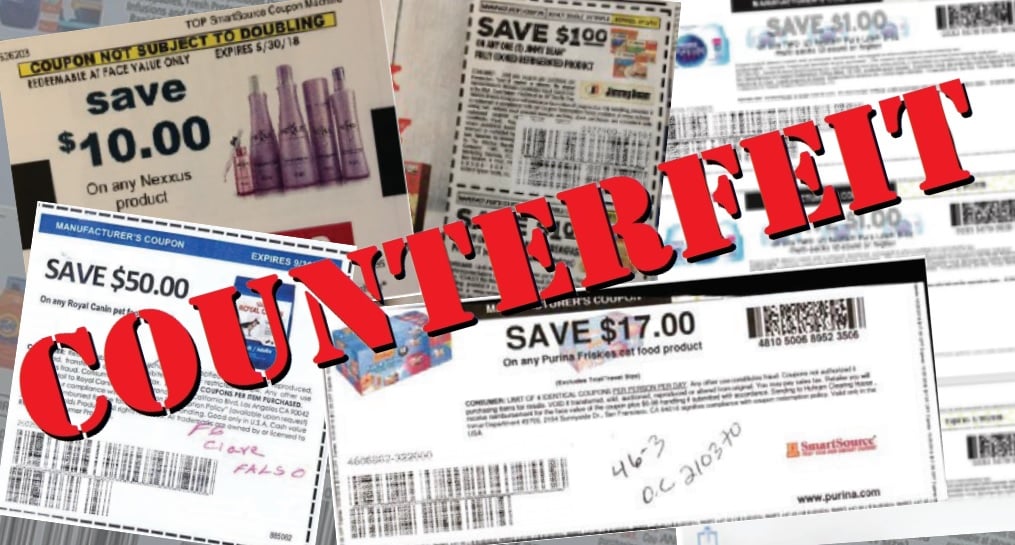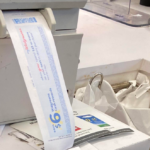
First on Coupons in the News:
A Massachusetts husband and wife have been ordered to pay more than $500,000 in restitution to dozens of companies, after they admitted to creating thousands of counterfeit coupons and selling them online. But they’ve avoided prison time, in a case that could have seen them sentenced to terms of up to 20 years each.
James and Catherine Pearson of Beverly, Massachusetts were sentenced Wednesday afternoon to one year of probation, ordered to pay $500,594.39 in restitution to the victimized companies, and they must forfeit the $89,791.45 in proceeds from their crime.
The sentencing comes some five years after prosecutors said the couple became expert coupon counterfeiters in a remarkably short amount of time. From their initial discovery of online couponing groups where they learned to save money, their online activities quickly escalated to buying counterfeit coupons, learning to create their own, then purchasing high-quality printers, ink, holographic “anti-counterfeiting” security stickers, and even glossy newsprint similar to the type used by Sunday coupon inserts, to launch a successful counterfeit coupon business that they advertised on social media.
“In the few short months of their counterfeit scheme,” prosecutors told the court, “they earned nearly $100,000 in profit for themselves and stole more than $500,000 from manufacturing companies,” ranging from $32.64 in losses suffered by the Hershey Company, to $254,399.94 worth of fake coupons redeemed for Procter & Gamble products.
After manufacturers began to notice a flood of fraudulent coupons showing up in the marketplace, investigators conducted undercover buys from the Pearsons back in 2018. At least 38 manufacturers were then able to trace counterfeits of all types – including printables, Catalinas, insert coupons and coupons from in-store “blinkie” machines – back to the couple. A selection of their creations is pictured above.
As exclusively reported by Coupons in the News at the time, the couple pleaded guilty last May to conspiracy to commit wire and mail fraud. While the maximum sentence would have been up to 20 years in prison, prosecutors initially recommended the couple serve two to three years. They later revised that down to five years’ probation, which is more than what the judge ultimately imposed, but the judge agreed with their restitution and forfeiture recommendations.
The Pearsons’ attorneys had argued that prison time was not warranted. In separate memos shared with the court, attorneys for each of the defendants told of the Pearsons’ troubled upbringings, their efforts to obtain stable employment, the challenges they currently face in caring for their special-needs son, and emphasized that they knew what they did was wrong and the ordeal they’ve gone through over the past five years has been punishment enough.
Catherine Pearson’s attorney said she initially saw couponing as a way to “help support their family,” before discovering “they could create and sell these coupons.” But “as the months elapsed, Catherine became more and more uncomfortable” with what they were doing, and the couple “stopped making and selling coupons on their own, before they were approached by law enforcement.”
James Pearson’s attorney told a similar story – though his memo displayed a curious combination of remorse, and an effort to convince the court that counterfeiting coupons is really no big deal.
“There is no question that stealing is wrong,” the memo reads, even though the Pearsons’ theft represented just “a single drop in the Olympic-sized swimming pool of the targeted corporations’ multi-billion-dollar annual profits.” Describing the couple’s crime as a “relatively victimless theft,” the attorney claimed “the damage to the corporations in this case is that they did not make as much profit on their products as they would have otherwise.”
As befits an expert couponer, James Pearson’s memo also offered a money-saving tip to the government. In arguing that prison time was unnecessary, his attorney helpfully pointed out that locking someone up is expensive and “imputes a large and unnecessary financial burden on our society.” Therefore, “aside from a generic idea that crime must be punished,” prison time would be uncalled for, for two people who have already learned their lesson.
Prosecutors offered a different view. The Pearsons’ crime was “an opportunistic, profit-making scheme untethered to either unfortunate family circumstances or a difficult employment history,” they told the court, and the “sentence should send a message that fraud schemes will not be tolerated.” Coupon counterfeiting is also far from a victimless crime, they pointed out, noting that victimized manufacturers “ultimately ask the consumer to bear the brunt of their losses – that means higher prices for all consumers and reduced opportunities to save.”
An individual concerned about imposing “a large and unnecessary financial burden on our society” might have considered that.
Besides, prosecutors said, while the Pearsons did stop selling counterfeit coupons before they were caught, they were still using the fake coupons they created to get thousands of dollars worth of discounted and free products for themselves – calling into question just how much of a change of heart they had about their actions. When executing a search warrant at the Pearsons’ home more than a year after they claimed to have stopped selling their counterfeit creations, law enforcement found “counterfeit coupons,” “several electronic devices which contained counterfeit coupons,” and “stockpiles of various household products – the types of products for which the Pearsons created counterfeit coupons.” (Click here to see images of the Pearsons’ stockpile.)
“Such a quick and easy money-making scheme may inspire others,” prosecutors concluded of the Pearsons’ brief career as coupon counterfeiters. “A sentence of probation, forfeiture and full restitution to those victim-manufacturers is necessary to dissuade other (potential) fraudsters.”
So the Pearsons’ sentence may appear more lenient than the ones imposed on other coupon counterfeiters like Lori Ann Talens, who was sentenced in 2021 to a dozen years in prison for running a $31 million counterfeit coupon empire. But prosecutors appear confident that the Pearsons have earned a just punishment, and will be living with the consequences of their actions for years to come, as they slowly pay down the half-million dollars in restitution they owe.
“The only circle of people that are paying attention to the Pearson case” are “their friends and family,” James Pearson’s attorney claimed. But one coupon news publication in particular, and readers of said publication like you, have been paying attention to this case from the start. And now, any other would-be coupon counterfeiter who learns of this case may get the message that the punishment for cashing in on coupon crime could be a price they’re not willing to pay.











But you can go in the store and Steal up to 1K and not get punished, I guess the companies only lose money when people don’t physically steal 😒